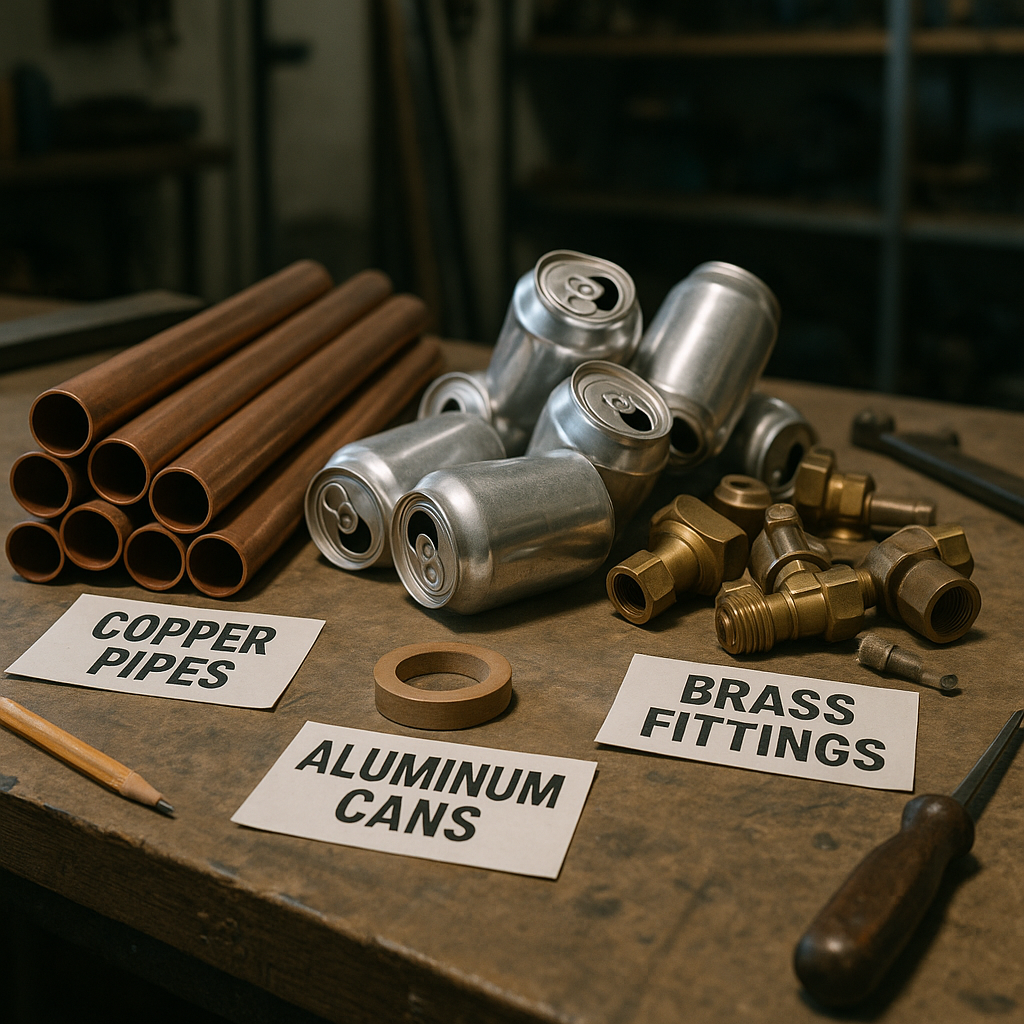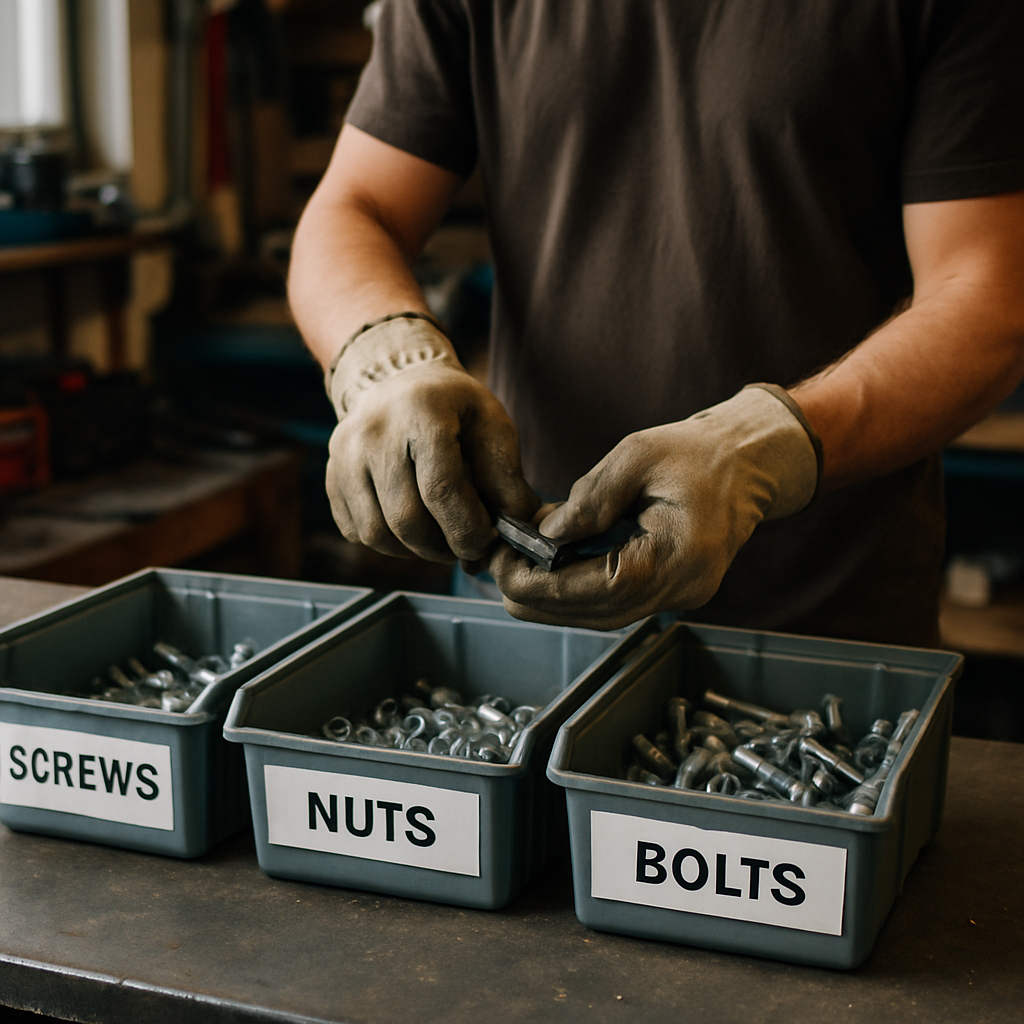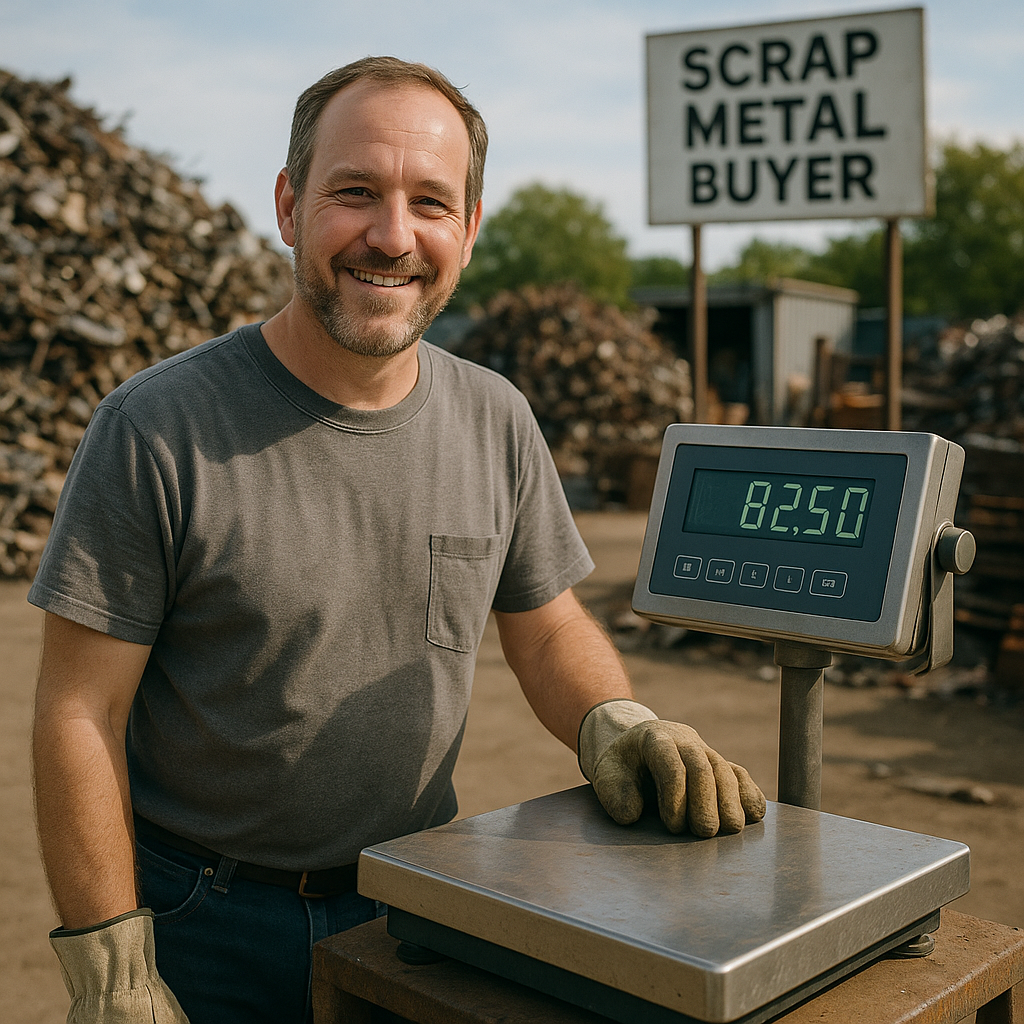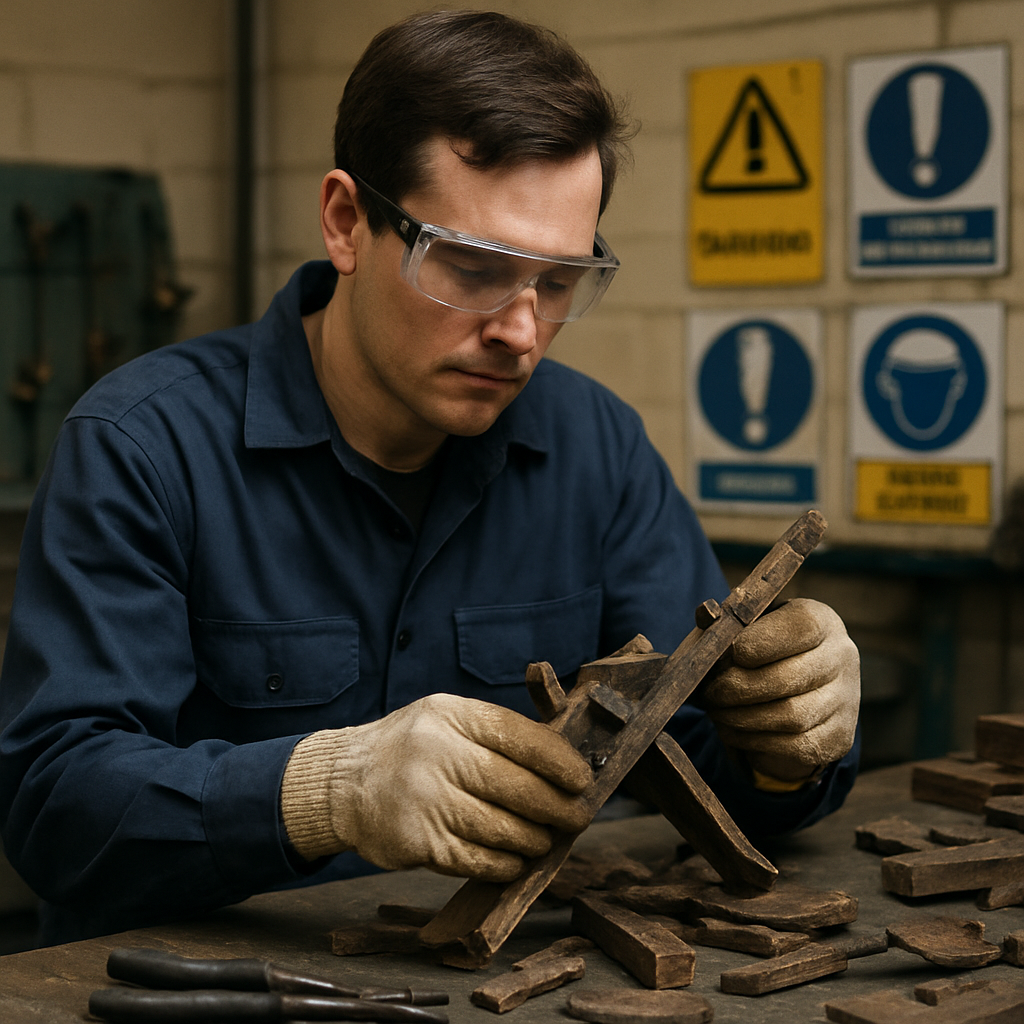5901 Botham Jean Blvd, Dallas, TX 75215
Disvover How to Sell Scrap Metal for Extra Cash
September 6, 2025One person’s trash can indeed be another’s treasure when it comes to scrap metal. That rusty pile of metal in your garage or backyard could actually be worth hundreds of dollars. Scrap metal recycling is one of the most accessible ways to earn extra income while also contributing to environmental conservation.
Each year, millions of tons of metal are recycled rather than ending up in landfills. This process conserves natural resources, reduces energy consumption, and lowers greenhouse gas emissions. By selling your scrap metal, you join this sustainable cycle while boosting your finances.
Whether you’re clearing out unwanted items, renovating your home, or collecting metal specifically for sale, this guide will help you identify valuable metals, prepare them properly, and find the best places to sell them. With metal prices frequently fluctuating, knowing when and where to sell can mean the difference between modest returns and substantial profits.
What Types of Scrap Metal Are Most Valuable?

When recycling scrap metal, not all materials offer the same return for your effort. Non-ferrous metals typically fetch higher prices at recycling yards due to their inherent properties and market demand.
Copper is at the top of the value hierarchy in the scrap metal industry. Its excellent electrical conductivity and corrosion resistance make it indispensable across multiple sectors. Bare bright copper wire typically brings the highest price, with #1 copper tubing closely following. Even small amounts of copper are worth collecting.
Aluminum ranks second among commonly found valuable scrap metals. Its lightweight nature and infinite recyclability make it highly sought after. Clean aluminum extrusion, often found in electronics as heat sinks or window frames, commands premium prices compared to mixed aluminum scrap.
Brass, an alloy of copper and zinc, holds significant value in the scrap market. Common sources include plumbing fixtures, musical instruments, and decorative items. Clean brass can earn over $2 per pound at many recycling centers, making it well worth separating from other materials.
Non-Ferrous vs. Ferrous Metals
The key distinction in scrap metal value lies between non-ferrous and ferrous materials. Non-ferrous metals contain no iron and generally command much higher prices. These include copper, aluminum, brass, and stainless steel. A simple magnet test helps identify them—non-ferrous metals won’t stick to a magnet.
Ferrous metals contain iron and are magnetic. Although they bring lower prices per pound (often just pennies), they compensate for this in abundance. Common ferrous materials include steel, cast iron, and sheet metal. Despite their lower value, these metals remain worth recycling due to their volume and environmental benefits.
Stainless steel occupies a middle ground in the value spectrum. Though it contains iron, its nickel and chromium content significantly boosts its worth above regular steel. Clean 304 stainless steel (non-magnetic) typically brings 30-40 cents per pound, while 316 stainless commands even higher prices.
Specialty and Precious Metals
Several specialty metals can deliver substantial returns when properly identified. Lead, commonly found in car batteries and some roofing materials, consistently holds value. Zinc, tungsten, and various high-temperature alloys also command good prices when sorted correctly.
Catalytic converters deserve special mention, as they contain precious metals like platinum, palladium, and rhodium. Their value varies widely based on type and size, with some foreign models fetching over $200 each.
In electronics recycling, circuit boards containing gold contacts and other precious metals can be worth separating. Some specialized buyers pay premium prices for boards with visible gold components compared to standard e-waste prices.
Understanding the relative value of different scrap metals allows recyclers to prioritize their collection efforts. While copper and other non-ferrous metals offer the highest per-pound return, don’t overlook the cumulative value of abundant ferrous materials. Smart sorting and identifying specialty metals can significantly boost your recycling revenue.
How to Prepare and Sort Your Scrap Metal

Proper preparation and sorting are crucial for maximizing the value of your scrap metal. Recyclers pay premium prices for well-organized, clean materials, as this reduces their processing costs. Taking time to prepare your scrap can increase your returns by 20-40% compared to bringing in mixed or contaminated materials.
Separate Ferrous from Non-Ferrous Metals
The first step in sorting is distinguishing between ferrous and non-ferrous metals. This fundamental division can significantly impact your earnings, as non-ferrous metals typically command higher prices.
Use a magnet to perform this simple but effective test. If the magnet sticks to the metal, it contains iron and is classified as ferrous, including steel, cast iron, and some grades of stainless steel. If the magnet doesn’t stick, you’re dealing with more valuable non-ferrous metals like copper, aluminum, brass, or bronze.
Keep these categories in clearly labeled containers. Even this basic level of sorting can substantially increase the value of your scrap compared to mixed loads.
Further Sort by Metal Type
Once you’ve separated your metals into ferrous and non-ferrous categories, take sorting a step further by dividing them by specific metal type:
- Copper: Separate into #1 bare bright (clean wire), #1 copper, and #2 copper (painted or with solder)
- Aluminum: Separate clean extrusions, cast aluminum, and aluminum cans
- Brass: Keep plumbing fixtures, decorative items, and other brass components together
- Steel: Separate light iron from heavy melt, and isolate stainless steel
This detailed sorting approach takes more time but can increase your returns by an additional 15-20% compared to basic sorting.
Clean Your Metals
Cleanliness significantly impacts the value of your scrap. Contaminated metals require more processing by recyclers, resulting in lower payouts for you. Take these steps to clean your scrap:
- Remove all non-metal attachments like plastic, rubber, wood, or fabric
- Strip insulation from copper wiring to increase its value by 30-50%
- Wipe down greasy or oily metal parts with rags
- Remove heavy rust with a wire brush when feasible
While perfectly clean metal is ideal, focus your efforts on the highest-value materials. For example, spending time cleaning copper will yield better returns than cleaning steel.
Dismantle Complex Items
Breaking down complex items into their component metals can significantly increase their value. An old appliance contains various metals that, when sorted separately, can yield 30-100% more value than scrapping the item whole.
For example, an old washing machine contains a steel outer shell, copper motor windings, aluminum components, and various other metals. Taking the time to dismantle these items puts more money in your pocket.
Identify Metals Visually
When sorting non-ferrous metals, use these visual identification tips:
- Copper: Distinctive reddish-brown color that reveals a similar color when scratched
- Aluminum: Light silver color, notably lightweight, and reveals bright silver when scratched
- Brass: Yellow or gold-like appearance, heavier than aluminum but lighter than copper
- Stainless Steel: Silver color with a distinctive dull sheen, some grades slightly magnetic
If you’re unsure about a metal’s identity, keep a separate container for unidentified pieces and ask the scrapyard for help when you bring in your materials.
Store Sorted Metals Properly
Once you’ve sorted your metals, store them in appropriate containers:
- Use sturdy bins for heavier metals like copper and brass
- Lightweight bins or bags work well for aluminum
- Consider crushing aluminum cans to save space
- Store high-value metals like copper in secure locations
- Label all containers clearly to maintain organization
Proper storage prevents cross-contamination and makes transportation to the scrapyard more efficient.
Safety First
Always prioritize safety when handling scrap metal:
- Wear cut-resistant gloves to protect against sharp edges
- Use safety glasses to shield your eyes from metal fragments
- Consider long sleeves and pants to minimize skin exposure
- Ensure your tetanus vaccination is current
- Use proper lifting techniques for heavy items
Never compromise safety for efficiency when handling scrap metal.
Pro Tip: Timing Your Sale
Metal prices fluctuate based on market conditions. Consider these strategies for timing your scrap metal sales:
- Track market trends using websites like Recycling Today
- Call several scrapyards to compare current prices
- Consider holding valuable metals when prices are low if storage permits
- Develop relationships with scrap dealers who might alert you to price changes
By combining proper sorting, cleaning, and strategic timing, you’ll maximize the value of your scrap metal and develop a reputation as a knowledgeable, prepared seller that scrapyards prefer to work with.
Finding the Right Scrap Metal Buyer

Researching local scrapyards and metal recycling centers is crucial for identifying reputable scrap metal buyers. The market for recycled metals varies in pricing, with rates often differing significantly even within the same area. Taking the time to compare multiple buyers can substantially increase your profits.
When beginning your search, consult your state government’s website for a directory of licensed scrap yards. Online resources like the iScrap App and Earth911 can help locate recycling facilities nearby. These tools often provide current metal prices, helping you understand market rates before visiting.
Price comparison should be your first step when evaluating potential buyers. Some recyclers openly display their pricing on boards, websites, or apps, while others reveal rates only after weighing. Transparency in pricing often indicates a trustworthy operation. Be cautious of yards that don’t disclose rates until after you’ve committed to selling.
Evaluating More than Price
While pricing is important, other factors can influence your choice of buyer. Location plays a significant role in convenience and overall value. Urban yards or those near transportation hubs typically offer more competitive rates due to lower overhead costs.
Transportation expenses can quickly reduce your profits. Calculate the distance to each facility and consider fuel costs when comparing offers. For large loads, inquire whether the recycler provides pickup services, which can save time and expense.
Payment methods and speed are crucial considerations. Reputable buyers use calibrated digital scales for accurate weighing and offer prompt payment. Most legitimate operations now process payments electronically, ensuring a secure transaction record.
Building Valuable Relationships
Developing relationships with reliable buyers can yield significant benefits over time. Regular sellers often receive preferential treatment, including better prices or reduced processing times. Visit multiple yards to assess their operations before committing to one.
Evaluate each facility’s cleanliness, staff professionalism, and overall efficiency. Long wait times, poorly maintained equipment, or discourteous service may indicate issues with the operation. Note busy periods at each yard to plan your visits accordingly.
Creating a simple spreadsheet can help track and compare different buyers’ offers and services. Record prices for common metals, wait times, distance from your location, and any additional services offered. This systematic approach identifies which buyer offers the best overall value for your specific situation.
Remember that the highest price doesn’t always mean the best deal. Sometimes accepting slightly lower rates from a recycler who provides excellent service, accurate weighing, and a convenient location can be more beneficial in the long run.
Finally, verify that any buyer you consider is properly licensed and follows environmental regulations. Legitimate recyclers will readily provide documentation of their permits and certifications, ensuring your materials are processed responsibly.
Safety and Legal Considerations When Selling Scrap Metal
Essential Safety Gear for Handling Scrap Metal
Working with scrap metal involves considerable physical hazards, necessitating adequate protection. Heavy-duty gloves are crucial to prevent cuts from sharp edges and protect your hands from harmful substances that may be present on metal surfaces. Steel-toed boots protect your feet from falling objects, a common risk when handling heavy metal pieces.
Safety goggles are essential to shield your eyes from metal fragments or dust that can cause serious injuries. For certain materials that might release toxic dust or fumes, respiratory protection is necessary. Always inspect your protective equipment before each use and replace damaged items promptly.
Thick clothing or disposable coveralls offer added protection against sharp edges and potentially harmful substances on metal surfaces. This precaution helps prevent skin injuries and reduces the risk of contamination from hazardous materials often found in scrap.
Safe Handling Techniques
Proper lifting techniques are crucial when working with scrap metal. Always bend at your knees instead of your waist when picking up heavy items to avoid back injuries. For larger or awkward pieces, use mechanical aids like dollies, carts, or forklifts whenever possible.
Maintain a clean and organized work area to prevent accidents. Promptly remove debris and loose scrap pieces from walkways. Poor visibility or cluttered spaces significantly increase the risk of injury when handling potentially dangerous materials.
Be particularly cautious of sharp edges that can cause serious cuts. Approach jagged metal carefully, and use tools instead of your hands whenever possible. Stay aware of your surroundings and communicate clearly with others when moving large materials.
Legal Requirements for Selling Scrap Metal
Most jurisdictions require sellers to present valid government-issued photo identification when selling scrap metal. This requirement aims to prevent metal theft and ensure accountability in the recycling stream. Some facilities may also record additional information, such as vehicle registration numbers or even fingerprints, depending on local regulations.
Payment restrictions are common in many areas. Cash payments for scrap metal are often restricted or prohibited entirely, especially for nonferrous metals like copper and aluminum. Instead, payment is typically made by check or electronic transfer to establish a paper trail that helps deter money laundering and the sale of stolen goods.
Record-keeping requirements apply to both sellers and buyers. Recycling facilities must maintain detailed transaction records, including the date and time, material description, weight, payment amount, and seller information. These records must be kept for a specified period and made available to law enforcement upon request.
Restricted and Prohibited Materials
Not all metal items can be legally recycled. Scrap yards are prohibited from accepting materials that pose safety risks, such as items containing asbestos or sealed, pressurized containers like gas cylinders. Materials from public property, such as street signs, manhole covers, and utility components, are typically restricted.
It’s illegal to sell metal items marked with the logo or name of a government entity, utility company, or cemetery without proper documentation. If you need to sell restricted materials, you must provide proof of ownership, such as a bill of sale or an authorization letter from the property owner.
High-theft risk items like catalytic converters, copper wiring, or telecommunication equipment with identifying marks may trigger additional verification requirements. Be prepared to provide documentation showing the legitimate source of these materials.
Environmental Compliance Considerations
Scrap metal may contain hazardous substances such as lead, mercury, or cadmium. These materials can release toxic fumes during processing or cause health problems through direct contact. Follow proper procedures for identifying and handling potentially contaminated materials to ensure environmental compliance.
The Environmental Protection Agency (EPA) regulates many aspects of scrap metal processing to protect air, water, and soil quality. Items containing refrigerants, oils, or other hazardous components require special handling and processing. Always ensure these materials are properly drained and disposed of according to regulations before recycling.
Maintain good hygiene practices throughout the handling process. Wash your hands thoroughly after touching scrap metal and before eating or drinking to prevent accidental ingestion of harmful substances. This simple practice helps protect your health when dealing with potentially contaminated materials.
Know Your Local Regulations
Scrap metal laws vary significantly by state and even by municipality. Research the specific requirements in your area before attempting to sell scrap metal. Many states have implemented specialized databases and reporting systems that recyclers must use to track transactions and prevent theft.
Some areas require special licensing for businesses that buy or sell significant quantities of scrap metal. While individual sellers typically don’t need licenses, they must comply with all identification and documentation requirements established by local laws.
The consequences for non-compliance can be severe, ranging from fines and rejected sales to potential criminal charges for knowingly selling stolen materials. Stay informed about changing regulations, as laws are frequently updated in response to trends in metal theft and recycling practices.
Conclusion: Turning Your Scrap into Profit

Selling scrap metal is a rewarding way to earn extra income while positively impacting the environment. By identifying which metals provide the highest return, effectively sorting and preparing materials, and finding trustworthy buyers who offer fair prices, you can transform waste into valuable resources. Always prioritize safety when handling scrap metal, and accurately identifying materials will help maximize your earnings.
Ready to begin your scrap metal recycling journey? Contact Okon Recycling at 214-717-4083 for expert guidance on transforming unwanted metal into profit, while contributing to a more sustainable future.
